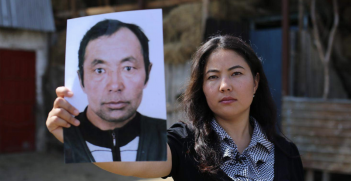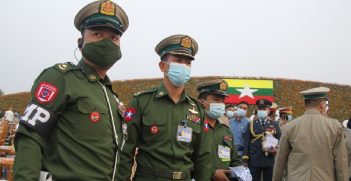China’s Persecution of the Uyghurs: Australian Action, Chinese Pressure

The plight of the Uyghur population in China’s Xinjiang Autonomous Region (XUAR) has become well known in recent years. While Australia has spoken out against the persecution, it has not recognised China’s actions as genocide.
The Uyghurs are an ethnic and religious minority. For many years, the Chinese government has been persecuting Uyghurs because of their minority status. This has included mass surveillance, an estimated one to three million people in detention, forced assimilation, forcible transfer of children, forced sterilisation, forced labour, sexual violence, enslavement and torture. Reports have found that “Chinese policy appears to be largely directed toward destroying, in substantial part, the Uyghur community’s ability to regenerate, primarily through attacking the reproductive capacity of Uyghur women” through forced sterilisation and contraception.
UN Human Rights Report Condemns China
In August 2022, the United Nations (UN) Office of the High Commissioner for Human Rights (OHCHR) released a report on the human rights situation in the Xinjiang region that focused on the Uyghur minority population. This report found that the Chinese government is committing serious human rights violations against the Uyghurs and other predominantly Muslim communities. Such violations included the rights to privacy, movement, health (including reproductive health), religious freedom, and family (including reproductive rights), and freedom from forced labour, slavery, and torture. While the report avoided the word “genocide,” it noted:
The extent of arbitrary and discriminatory detention of members of Uyghur and other predominantly Muslim groups, pursuant to law and policy, in context of restrictions and deprivation more generally of fundamental rights enjoyed individually and collectively, may constitute international crimes, in particular crimes against humanity.
The OHCHR determined that:
The human rights situation in XUAR also requires urgent attention by the [Chinese] Government, the United Nations intergovernmental bodies and human rights system, as well as the international community more broadly.
This highlights that the persecution of the Uyghurs is a significant issue that warrants action not only from the Chinese government, but also from other states.
China Stifles Debate in the Human Rights Council
Following this report, a motion was put forward by many states including Australia, Canada, and the United States (US)during the 51st regular session of the Human Rights Council in early October 2022 . The motion drew attention to the OHCHR report and called for debate to take place in the Human Rights Council about the Uyghur situation. This motion failed to pass , with 19 countries opposing, 17 supporting, and 11 abstaining.
It is highly abnormal for such a procedural motion to be rejected. In fact, this is only the second time such a motion has been voted down. Countries such as Pakistan, Indonesia, the United Arab Emirates, Qatar, Brazil, Mexico, and Ukraine voted against it because they feared repercussions from China. Moreover, the vote was unsuccessful due to Chinese diplomatic lobbying of other states to vote against the motion. Disappointingly, the defeat of this motion is a perfect example of the long-term pressure that China has been able to exert on states to impede action in the UN and other international bodies. It is also demonstrative of how economic and political ties, as well as “big power” pressure, can undermine the protection of human rights. This highlights how states are only happy to stand up against human rights violations if doing so will not jeopardise their trade or economy. It also demonstrates the increasing power of China on the international stage.
There is nothing preventing another motion being raised in the Human Rights Council, so the states that raised this motion should not let this be the end of the matter. There is a need to demonstrate that the Human Rights Council is not beholden to political and economic whims of states, and is able to fulfil its purpose by standing up for the human rights of those who cannot do so themselves.
What Else Can Australia Do?
Australia is already quite active with regards to the Uyghur situation. As noted, Australia was one of the states that put forward the motion for debate in the Human Rights Council. The Australian government has also regularly spoken out about the situation of the Uyghurs, although with focus on the forced labour. A bill prohibiting the importation of any goods that have been produced by forced labour passed the Senate in August 2021, but lapsed at the dissolution of the government after the 2022 election. This bill, proposed by Independent Senator Rex Patrick, sought to ensure that Australian businesses and citizens do not purchase goods made from the forced labour of Uyghur people. This is particularly important as, in 2019, Australia’s trade with Xinjiang increased by 150 percent. Commendably, the bill was later expanded to cover goods produced by forced labour in any country. In considering what Australia can do with regards to the Uyghur situation, the bill should be reintroduced with amendments to ensure specific inclusion of penalties so the provisions will be enforceable.
Australia should also bring sanctions against relevant Chinese authorities responsible for the crimes against the Uyghurs. This is possible under the Australian Autonomous Sanctions regime, implemented through the Autonomous Sanctions Act 2011 (Cth) as amended by the Autonomous Sanctions Amendment (Magnitsky-style and Other Thematic Sanctions) Act 2021. This Magnitsky-style Amendment Act reformed the sanctions regime by explicitly enabling sanctions to be either country-specific or thematic, including sanctions for “serious violations or serious abuses of human rights.” The treatment of the Uyghurs is exactly the situation that these sanctions were intended to address. Such sanctions could also be a quicker way of implementing bans on products produced by forced labour, as they can restrict the provision of assets to designated persons or entities.
While Australia has “consistently condemned human rights violations against the Uyghurs and other ethnic and Muslim minorities in Xinjiang and across China,” Australia has not labelled the crimes against the Uyghurs as genocide. In fact, in March 2021, the previous Coalition government blocked a motion to recognise these crimes as genocide. Although some senators have referred to genocide in parliamentary discussions, there has generally been little willingness among politicians for the Australian government to recognise the crimes against the Uyghur as genocide. This may be due to an unwillingness to antagonise China further in an already strained relationship.
However, governments of the US, France, Canada, the United Kingdom, and the Netherlands have recognised the crimes against the Uyghurs as genocide. The Uyghur (People’s) Tribunal, think tanks, and other organisations are in agreement that the crimes amount to genocide. Although it can be politically challenging, genocide recognition is crucial when the crime is being committed, because it triggers obligations under the Genocide Convention and supports international action against regimes committing these atrocities. If Australia wants to continue its leadership on the Uyghur issue it must explicitly recognise the crimes against the Uyghurs as genocide and crimes against humanity.
Dr Melanie O’Brien is Associate Professor of International Law at the University of Western Australia and President of the International Association of Genocide Scholars (IAGS).
This article is published under a Creative Commons License and can be republished with attribution.





